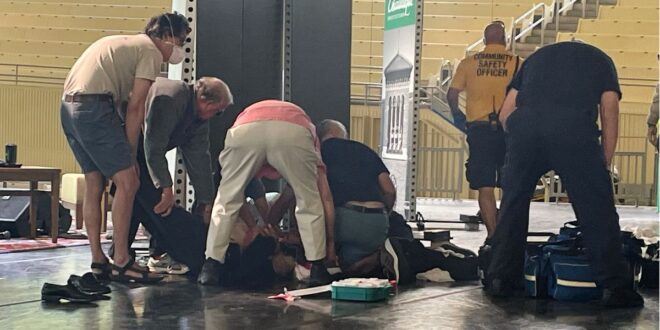By Kevin Zhang
Salman Rushdie, an Indian-born novelist who spent years in hiding after Iran urged Muslims to murder him due to his writing, was stabbed in the neck and lower abdomen onstage at a public lecture at western New York’s Chautaqua Institution.
Following the attack, Rushdie was airlifted to a hospital, according to police.
Rushdie underwent hours of surgery and was put on a ventilator. He was unable to speak Friday evening after the attack.
Whilst the author is expected to survive, he is unfortunately also expected to be severely disabled. “The news is not good. Salman will likely lose one eye; the nerves in his arm were severed; and his liver was stabbed and damaged.” said Andrew Wylie, Rushdie’s book agent, in an email.
The 75-year old Rushdie was being introduced to give a talk to hundreds of listeners on artistic freedom at the Chautauqua Institution when a man rushed to the stage and lunged at the novelist, who has been living with a bounty on his head since the late 1980s.
Attendees of the event helped police to wrestle the man off of Rushdie, and a New York State Police trooper at the scene arrested the attacker. The suspect was identified as 24-year-old Hadi Matar, from Fairview, New Jersey, who had bought a pass to the event.
A doctor in the audience helped tend to Rushdie while emergency medical care was on the way.
Rushdie was born in a Muslim Kashmiri family in Bombay (now Mumbai), before moving to the United Kingdom. He has for a long time faced threats over his fourth novel, “The Satanic Verses”, which is considered blasphemous by many Muslims, and is banned in many majority-Muslim countries.
A few months after the book’s publication, Ayatollah Ruhollah Khomeini, supreme leader of Iran, pronounced a fatwa, or religious edict, which called upon Muslims to kill Rushdie and anyone else involved in the novels publication for blasphemy.
Rushdie has called his book “pretty mild” but went into hiding for nearly a decade. The Japanese translator of the book, Hitoshi Igarashi, was murdered in 1991. The Iranian government said in 1998 that it would no longer uphold the fatwa, after which Rushdie came out of hiding.
Some Iranian organizations, including government-affiliated ones, have raised bounties on Rushdie’s head, some of which totaling millions of dollars.
 Tempus Magazine By Students, For Students
Tempus Magazine By Students, For Students 

